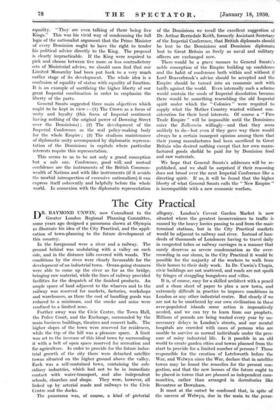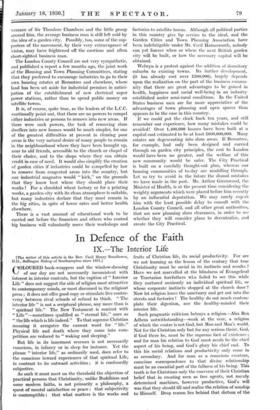The City Practical
DR. RAYMOND UNWIN, now Consultant to the Greater London Regional Planning Committee, some years ago designed a panorama shown at Olympia to illustrate his idea of the City Practical, and the appli- cation of town-planning to the future development of this country.
In the foreground were a river and a railway. The ground behind was undulating with a valley on each side, and in the distance hills covered with woods. The conditions by the river were clearly favourable for the development of an industrial town. Ocean-going steamers were able to come up the river as far as the bridge, bringing raw material, while the lines of railway provided facilities for the despatch of the finished products. An ample space of land adjacent to the wharves and to the railway was reserved for markets, factories, workshops and warehouses, as there the cost of handling goods was reduced to a minimum, and the smoke and noise were confined to a limited zone.
Further away was the Civic Centre, the Town Hall, the Police Court, and the Exchange, surrounded by the main business buildings, theatres and concert halls. The higher slopes of the town were reserved for residences, while the tap of the hill was a pleasure space. A limit was set to the in:Tease of this ideal town by surrounding it with a belt of open space reserved for recreation and for agriculture. In order to provide for the future indus- trial growth of the city there were detached satellite towns situated on the higher ground above the valley. Each was a self-contained town, containing the sub- sidiary industries, which had not to be in immediate contact with water-transport, and also, independent schools, churches and shops. They were, however, all linked up by arterial roads and railways to the Civic Centre and the docks. . , The panorama was, of course, a kind of pictorial allegory. London's Covent Garden Market is now situated where the greatest inconvenience to traffic is caused by the heavy lorries passing to and from the main terminal stations, but in the City Practical markets would be adjacent to railway and river. Instead of hun- dreds of thousands of Londoners having to travel daily in congested tubes or railway carriages in a manner that surely deserves as severe condemnation as the over- crowding in our slums, in the City Practical it would be possible for the majority of the workers to walk from their homes to their daily work. In Dr. Unwin's Utopia, civic buildings are not scattered, and roads are not spoilt by fringes of straggling bungalows and villas.
It is, of course, easy for a skilled architect with a pencil and a clean sheet of paper to plan a new town, and extremely difficult in practice to improve conditions in London or any other industrial centre. But clearly if we are not to be smothered by our own civilization in these over-populated islands some action is imperatively needed, and we can try to learn from our prophets. Millions of pounds are being wasted every year by un- necessary delays in London's streets, and our mental hospitals are crowded with cases of persons who are unable to survive as normal individuals under the pres- sure of noisy industrial life. Is it possible in an old world to create garden cities and towns planned from the start to provide for a limited number of persons ? Those responsible for the creation of Letchworth before the War, and Welwyn since the War, declare that in satellite towns may be found the remedies for the present con- gestion, and that the new houses of the future ought to be placed in towns that are planned as independent com- munities, rather, than arranged in dormitories like Becontree or Downham.
It must at the outset be confessed that, in spite of the success of Welwyn, due in the main to the , perse- verance of Sir Theodore Chambers and the little group around him, the average business man is still left cold by the idea of a garden city. Possibly, too, some of the sup- porters of the movement, by their very extravagance of vision, may have frightened off the cautious and often short-sighted business man.
The London County Council are not very sympathetic, and published a report a few months ago, the joint work of the Housing and Town Planning Committees, stating that they preferred to encourage industries to go to their own housing estates at Becontree and elsewhere, where land has been set aside for industrial premises in antici- pation of the establishment of new electrical super power stations, rather than to spend public money on satellite towns.
It is, of course, quite true, as the leaders of the L.C.C. continually point out, that there are no powers to compel either industries or persons to remove into new areas. If there were such powers, the task of removing slum dwellers into new houses would be much simpler, for one of the greatest difficulties at present in clearing poor areas is the very natural desire of many people to remain in the neighbourhood where they have been brought up, near to old friends, accessible to the church or chapel of their choice, and to the shops where they can obtain credit in case of need. It would also simplify the creation of garden cities if industries could be compelled by law to remove from congested areas into the country, but our industrial magnates would " kick," on the grounds that they know best where they should place their works ! For a shredded wheat factory or for a printing works, a garden city with its clean atmosphere is suitable, but many industries declare that they must remain in the big cities, in spite of lower rates and better health elsewhere.
There is a vast amount of educational work to be carried out before the financiers and others who control big business will voluntarily move their workshops and factories to satellite towns. Although all political parties in this country give lip service to the ideal, and the Garden Cities and Town Planning Association have been indefatigable under Mr. Cecil Harmsworth, nobody can yet foresee when or where the next British garden city will be built, or how the necessary capital will be obtained.
Welwyn is a protest against the addition of dormitory suburbs to existing towns. Its further development, (it has already cost over £500,000), largely depends upon the realization on the part of the business commu- nity that there are great advantages to be gained in health, happiness and social well-being in an industry established under semi-rural conditions. In the United States business men are far more appreciative of the advantages of town planning and open spaces than appears to be the case in this country.
If we could put the clock back ten years, and still remember our experience, how many mistakes could be avoided! Over 1,400,000 houses have been built at a capital cost estimated to be at least £600,000,000. Many estates are degenerating into slum areas. If Becontree, for example, had only been designed and carried through on garden city principles, the cost to London would have been no greater, and the welfare of this new community would be safer. The City Practical is built on a carefully thought-out plan, whereas our housing communities of to-day are muddling through. Let us try to avoid in the future the dismal mistakes we have made in the past. Mr. Arthur Greenwood, the Minister of Health, is at the present time considering the weighty arguments which were placed before him recently by an influential deputation. We may surely expect him with the least possible delay to consult with the London County Council, and all other great authorities, that are now planning slum clearances, in order to sec whether they will consider plans to decentralize, and create the City Practical.







































 Previous page
Previous page